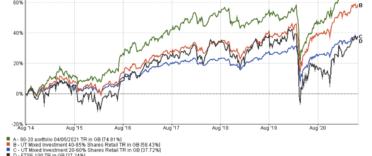
Core inflation, which does not include food or energy prices, dropped from 5.1% to 4.5%. Services inflation – which focuses more on categories like education, hospitality and culture rather than the cost of goods – fell from 6.5% to 6.1%, 0.1% less than the expected reduction.
It is important to remember that this change does not signal prices going down. The cost of living is still going up, just not as quickly as it was previously. However, it is a shift closer to the Bank of England's target rate of 2%.
Why has the rate of inflation decreased?
The key number behind February's inflation drop was food inflation. The rate decreased from 7% to 5%, an eleventh consecutive monthly drop. While prices remain much higher than they were a couple of years ago – there has been an estimated 25% increase in the cost of food since January 2022 – the sharp increases we saw in 2023 have softened.
The rising cost of alcohol, tobacco, clothing and footwear also slowed in the year to February 2024. This overall fall in the growth of the cost of goods is positive news, but it does mean that food and clothes are still getting more expensive.
When looking at the services metric of inflation, figures reveal a less dramatic fall. This has been put down to an increase in wages across certain sectors due to skills and labour shortages. Services inflation remaining high could be enough of a reason for the Bank of England to delay any changes to the Bank of England base rate, potentially to see what impact the increases to the national minimum wage have in April.
What does the inflation data mean for savers?
Inflation has dropped to a two-and-a-half year low, but it remains high, which is bad news for savers. It isn't necessarily the case that high inflation brings about high interest rates and better returns for savers. While it is true that inflation remaining above the Bank of England’s 2% target means that the base rate of interest could be maintained for longer, high inflation is still bad news for your savings.
Firstly, banks often take much longer to pass on rate rises to savers than they do borrowers. This means it can take a long time for high inflation figures to translate to a boost in your savings rate. Secondly, inflation erodes the value of cash, so your money in the bank will buy you less as the cost of living goes up.
Slowing inflation is good news for savers, as what you have put away should hold its value for longer. You can find the best savings accounts on our article ‘Best savings accounts in the UK’.
What does the inflation data mean for the State Pension?
State Pension rises are calculated using the 'triple lock' system; the government's method of guaranteeing that State Pension payments will rise at the start of each tax year. Under triple lock, the State Pension will increase each April by the highest of three measures; 2.5%, average wage growth or the CPI rate of inflation. The CPI figure used is the year-to-date rate from the most recent September, while wage growth figures are recorded in July. This means that the relevant CPI figure for the April 2024 increase was measured back in September 2023. This figure, 8.5%, will be the rate that the Sate Pension rises by in April 2024.
However, high inflation is not good news for pensioners, just like it isn't for savers. While State Pension payments and inflation-linked annuities will rise, the value of the money is eroded by rising costs.
What does the inflation data mean for mortgages?
Inflation slowing down could help to reduce mortgage rates in the long term, as the Bank of England would be expected to cut rates as the CPI approaches the Bank’s 2% inflation target.
Of course, we don't know how many more months of falling inflation it will take for the Bank of England to take action and start cutting interest rates. It will want to be confident that reduced inflation is a consistent trend across the economy and unlikely to bounce back up. For the latest on when the Bank of England is likely to cut interest rates, check out our article 'Are interest rates going to go down in 2024?'. In summary, the latest ONS figures are a step in the right direction for those worried about high interest rates. You can find the best mortgage rates currently available in the UK on our ‘Best mortgage rates in the UK’ page.





